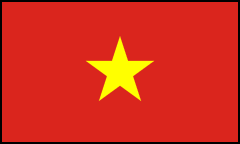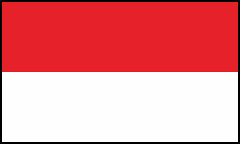Nowadays, Indonesia becomes more popular with foreign direct investment players who want to enter the Asia market, as the country marks the 16th largest economy in the world in 2019. It causes many foreign investors to set their eyes to expand their businesses to Indonesia. Entering Indonesia’s market somehow will offer significant results for foreign direct investment players.
Before getting into deep about how and why foreigners should expand their businesses to Indonesia. It’s better to take a look at Indonesia’s economy first.
Overview of Indonesia’s Economy in General
As stated by the World Bank and projections from Trading Economics, Indonesia’s GDP was US$1126 billion back in 2019. Indonesia’s GDP accounts for 0.93% of the world economy. In fact, Indonesia’s GDP has continuously grown since 2015.
Furthermore, according to the new Asian Development Bank (ADB) report, Indonesia’s economy is expected to grow by only 2.5% this year, and it’s a four-year low of 5.02% in 2019. The COVID 19 outbreak situation gave an impact to this country’s economy. However, it is expected to gradually improve in 2021.
The ADB report also says the domestic demand is expected to weaken, as business and consumer sentiment decreases. As the global economy will recover next year, Indonesia’s growth also hopes to gain momentum, with recently introduced investment reforms providing an additional stimulus.
The report says, the inflation which averaged 2.8% last year, is forecast to increase to 3% in 2020, before it might be declining to 2.8% in 2021. The inflationary pressure from tight food supplies and currency devaluation is expected to be partially counterbalanced by lower prices for non-subsidized fuel, as well as subsidies for electricity and food.
According to the World Economic Forum’s Global Competitive Index in 2019, Indonesia is in the 4th place within ASEAN region, behind Singapore, Malaysia, and Thailand. The Indonesian economy has been climbing steadily higher in the ranks of the moderately free, and it makes Indonesia a promising country for the foreigner entrepreneurs to expand their businesses here.
Indonesia’s government is expected to continue efforts to encourage more private investment in infrastructure and manufacturing. The government can achieve that goal by modernizing and simplifying investment regulations, and they also need to ensure the labor market controls, such as minimum wages, which will give an effect to employment growth.
The World Bank report says, Foreign Direct Investment (FDI) net inflows in Indonesia in 2019 was US$24.4 billion. It increased by 29% compared to the previous year. However, the FDI net outflows in 2019 was US$4.392 billion.
In the March quarter of 2020, due to ongoing COVID-19 pandemic, FDI to Indonesia slumped 9.2% year-on-year to US$6.4 billion (IDR 98 trillion), it is the lowest amount in 6 months to 1 year, if it compared with a 6.4% growth in the previous period. It all happened as the investors delayed business decisions due to the outbreak.
The leading sectors for FDI projects in Indonesia are trade and reparation, such as hotel and restaurant, chemical and pharmaceutical, Hosing, Industrial Estate, and office building. Meanwhile, the leading locations are Special Territory of Jakarta, West Java, and East Java.
There is a lot of potentials to grow the business and join the market here before the competitors enter. You might ask yourself why you should expand, or what are the opportunities for growing the business. Moreover, let’s check the details for the foreign direct investment in Indonesia below.
The Opportunities For Foreign Direct Investment in Indonesia
Indonesia renewed its Investment One-Stop Service (OSS) Centre on 26 January 2015, in which investors can now process their investment licenses and other related licenses in one office.
The centre is integrated with 22 ministries and agencies, and it covers the licensing processes for most of the business fields. Investors can also monitor the progress of their business license application online, and ensure that the deadline complies with Standard Operating Procedures (SOP).
By looking at how Indonesia has a lot of potential for more FDI projects, President Joko Widodo is expected to continue driving forward with large-scale developments, while the country is also attracting financial support from China for major infrastructure works under the Belt and Road Initiative (BRI).
The government plans to spend US$40 billion (IDR571 trillion) on the development of transport infrastructure in Jakarta by 2029. Announced in March 2019, the government aims to build a 120km light transit railway corridor in the capital city. In addition, in May 2019, the government announced plans to invest US$412 billion (IDR6 quadrillion) to develop Indonesia’s overall infrastructure during the period of 2020-2024. It includes the construction of 25 new airports, highways, affordable houses and power plants.
A study by Polling Indonesia had cooperated with the Indonesian Internet Providers Association (APJII) reported that, there are 171 million people, or 64.8% of the total population of 264 million Indonesians, were already connected to the internet in 2018. It represents an increase from 54.86% in 2017. It makes Indonesia become one of the top ten most improved countries in the Mobile Connectivity Index. This improvement has been broad and driven by better performance across all four enablers: infrastructure, affordability, consumer readiness, content and services.
With all of these opportunities, it can attract more FDI projects to Indonesia. But, in fact, there are some challenges that foreigners need to know as well.
The Challenges For Foreign Direct Investment in Indonesia
According to Transparency International’s Corruption Perception Index 2019, Indonesia ranks 85th out of 183 countries. However, that would mean foreign investors might have a few obstacles in building an investment climate in Indonesia, such as conflicting regulations, rigid labor laws, legal unpredictability, the rising cost of credit, and contract issues.
The World Bank reports and findings of Transparency International suggest corruption and inflexible domestic regulations have significantly affected both domestic and foreign investment in Indonesia.
Despite the challenges, Indonesia still has more opportunities and potential for foreigners to take and build a business here. As the country's infrastructure is growing, it will continue attracting more FDI projects to bring in Indonesia.
Additionally, you might be curious if it’s easy or complicated to expand the business here, but you should not be worried about that. As long as you meet the requirements, you will be fine.
The Requirements To Expand Businesses in Indonesia
Indonesia has several types of companies, which sometimes confuse foreign investors when choosing the most suitable for their business activities. See the details where we describe the differences in the type of company setup options in Indonesia!
1. The Indonesian Limited Liability Company (PT)
- Minimum Capital: it depends on Business License (SIUP) Categories.
- 100% local share
- The company is eligible to conduct business up to 3 different business lines.
- Minimum paid-up capital for Small SIUP is IDR 50.000.000 - IDR 600.000.000
- Minimum paid-up capital for Medium SIUP is IDR 600.000.000 - IDR 10.000.000.000
- Minimum paid-up capital for Large SIUP is above IDR 10.000.000.000
- Can be sponsor company of KITAS
- Minimum 2 shareholders, 1 Director, and 1 Commissioner
2. PT PMA (Penanaman Modal Asing) or Foreign Investment Company
- The minimum investment plan US$1 million
- The minimum paid-in capital US$250.000
- Shareholder: based on the negative investment list
- In the form of a limited liability company, which can perform complete business activities in Indonesia, includes generating revenue
- Has the same rights and responsibilities as a local company
- Only allowed to operate in 1 specific business area
- Minimum 2 shareholders, it can be individuals or legal entities
- Minimum organizational structure, 1 Director, and 1 Commissioner
- Minimum investment plan is over US$1 million
- Minimum paid-up capital is US$250,000
- The company can sponsor many foreign employees
3. Representative Office (KPPA)
- No Minimum Paid Capital Required
- Shareholder: Based on the negative investment list
- In the form of a branch office from the parent company overseas
- Activities are limited to marketing, research and promotion. It means that the representative office is not allowed to generate revenue or to conduct direct transactions in Indonesia. The transaction goes directly to company headquarters.
- There is no shareholder requirement
- There is no Director and Commissioner requirement
- There is no capital requirement
- Limited sponsorship of foreign employees, at least Chief of Representative Office and Assistant of Chief of Representative Office
These are all information about entering the market in Indonesia. You should pay attention to details, and complete all the requirements once you choose the legal entities for your business activities. If you are unsure about all these things, you can contact us anytime. Viettonkin will always be ready to assist you!









